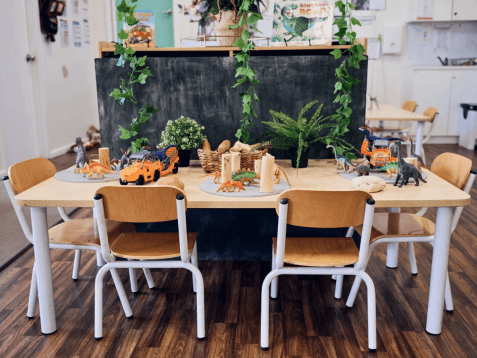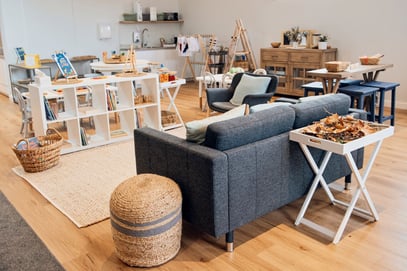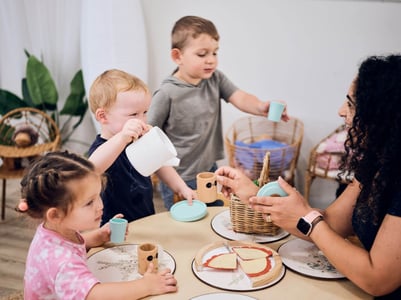Rather than adults managing children’s behaviour through rules, rewards and discipline, contemporary approaches encourage educators to support children to manage (regulate) their own feelings and behaviours. Contemporary approaches acknowledge children’s agency and autonomy in their own learning and support children to develop strategies for reflecting on and managing their behaviour and resolving conflicts with others.
Educators scaffold children's capacity to understand
Educators have a key role in fostering children’s awareness of their own feelings as well as the feelings of others. They scaffold children’s capacity to understand different perspectives and engage in collaborative conflict resolution.
Rather than relying on an adult to tell them what to do and how to behave, children who are aware of their own emotions and how they influence their actions are able to reflect on their feelings and make decisions about their behaviour that take into consideration the impact of their actions on others. This means they are increasingly able to regulate their own behaviour and build positive relationships with others.
In contrast to classroom management strategies that often require adults to step in and solve interpersonal conflicts for children, or disciplining children for ‘bad’ behaviour, contemporary approaches to social and emotional learning encourage educators to guide children’s behaviour. A guidance approach fosters the development of social problem-solving skills by encouraging children to articulate their feelings and ideas, listen to others’ ideas and understand others’ perspectives. As Louise Porter (2016) asserts, sensitive and responsive guidance scaffolds children’s self-regulation of their emotions, and builds skills of negotiation and collaboration.

Why is it important for early childhood educators to support children’s self-regulation of their behaviour?
Early childhood settings are ideal places for supporting children to identify and manage their emotions. Early childhood educators support children to identify their emotions and manage them in ways that are considerate of others.
Children in the early years are developing emotional intelligence or what is termed emotional literacy. Steiner (2003) identifies five main skills at the core of emotional literacy. They include the ability to:
- Recognise and name our own feelings
- Recognise other people’s feelings and the emotions they are experiencing (empathy)
- Manage our emotions by talking about them
- Recognise and take responsibility for our mistakes and take steps to rectify them and
- Interact appropriately and effectively by tuning in to the feelings of others and sensing their emotional states.
Understanding one’s own emotions and developing respect for others’ ideas and feelings are key to positive social interactions or what is also known as prosocial behaviour. With adult modelling and scaffolding, children learn to express their emotions constructively, consider the impact of their behaviour on others, show empathy to others and solve problems collaboratively. When children do not have these skills they have difficulty managing their emotion and are more likely to insist on their own perspectives and as a result conflicts with other children are likely to occur.
How can educators support children to manage their own behaviour?
Educators can support children’s self-regulation by
- designing learning environments that support positive behaviours
- providing appropriately challenging small group play-based experiences and flexible schedule
- planning learning experiences that support children to identify and express feelings
- establishing shared expectations for behaviour
- guiding children’s behaviour
- providing positive feedback
- knowing when and how to intervene to support collaborative social problem-solving.
- Reflect on what you do to support children to manage their own behaviour.
Designing learning environments that support positive behaviours
How does your centre’s learning environment support positive social interactions and relationships?
 A learning environment where children feel safe and supported, that encourages participation and collaboration and that has appropriate levels of challenge promotes prosocial behaviours.
A learning environment where children feel safe and supported, that encourages participation and collaboration and that has appropriate levels of challenge promotes prosocial behaviours.
A supportive environment includes children’s voices and provides opportunities for children to exercise agency. This means including children’s ideas in decisions regarding resources, experiences, routines and documentation of their learning.
Learning environments that foster positive social interactions provide a balance of quiet and active experiences and large blocks of time that enable children to explore resources and interact with each other. Quiet spaces both indoors and outdoors enable children to engage in solitary play and reflection and can be places where children can go when they feel overwhelmed by strong feelings. Large blocks of time and flexible schedules and routines allow children to feel in control of their experiences and their interactions. A rigid schedule with constant requirements to stop and pack away will often result in disruptive behaviours.
Positive learning environments consider children’s emerging social and emotional skills by providing sufficient resources and not expecting children to share when this is not developmentally appropriate.
Learning environments that fosters positive social interactions value everyone’s identities and address any issues of bias and stereotyping. Educators model inclusive language and practices and challenge any unfair language or behaviour.
Small group experiences support the building of relationships between educators and children and amongst children. In small groups educators and peers can scaffold positive social behaviours. At times educators may plan to encourage peer scaffolding of prosocial behaviours by encouraging a range of groupings so that children with less well-developed social skills have the opportunity to play with children with more established prosocial behaviours.
Providing appropriately challenging small group play-based experiences

When children are provided with choices about experiences and routines throughout the day and have opportunities to engage in small group play-based experiences they have agency and are active and engaged learners. When children are not engaged, when they spend long periods of time in large groups or in adult-directed learning experiences there are more likely to be issues with behaviour.
Careful planning of appropriately challenging small-group play-based experiences that are designed to encourage social interactions and collaboration, along with teacher guidance as children engage in these experiences, fosters social and emotional learning. An Australian study of early childhood pre-school teachers by Kirk and MacCallum in 2017 found that these experiences provide a safe and supportive environment where children learn to listen to others’ perspectives, express their ideas, negotiate and collaborate. The study found that teacher guidance of children’s learning in complex, challenging play contexts supports the development of self-regulation and prosocial behaviours by increasing children’s social interaction skills.
Planning learning experiences that support children to identify and express feelings
How and when do you talk about feelings with children? Do you acknowledge and talk about all emotions?
Effective fostering of social and emotional learning and positive behaviours requires careful planning so that the curriculum provides a balance of planned social and emotional experiences (such as shared books and creative arts experiences focused on emotions and social problem solving) and embedded opportunities to foster positive relationships throughout the day. This approach enables educators to develop strategies that are responsive to children’s emerging understandings and to integrate social and emotional learning across the program.
Specific experiences focused on identifying and expressing feelings include socio-dramatic play, puppets, books, creative arts, and feelings cards. It is important to acknowledge all feelings – there are no ‘good’ or ‘bad’ feelings. It is useful to think about some emotions such as anger as strong feelings.
The following ideas (adapted from Sorin, 2004) can be modified according to the interests and emerging understandings of the children in your group.
- Sharing books or creating your own stories with a focus on emotions and talking about how characters might be feeling/how you would feel in a similar situation.
- Singing songs and reciting rhymes and chants about feelings. These can be ones that are written by others or ones that you and the children create yourselves.
- Drawing faces or bodies, or making sculptures with clay or play dough, to show different feelings – such as happy, sad and angry.
- Listening to music and talking about, dancing, moving or painting how it makes you feel.
- Moving or doing body sculptures in a way that reflects different feelings – such as excited, angry and scared.
- Playing games with a focus on emotions – for example Mirror, mirror, how is xxxx feeling? or games with cards that illustrate different feelings.
- Using puppets or persona dolls to tell stories that explore feelings, different perspectives and solutions to common situations – for example not getting a turn or a dispute over a toy.
Establishing shared expectations for behaviour
What are your classroom ‘rules’? How are children involved in establishing these?
Rather than educators developing and enforcing rules for children’s behaviour, a guidance approach encourages educators and children to collaborate in the development of expectations of behaviour.
This means discussing with children the type of environment that we want to experience in our room and centre – for example, we would like our space to be calm and peaceful, we would like to be listened to when we speak.
Educators and children can work together to talk about and write down the expectations of behaviour. These should be written in the children’s language and displayed with images at children’s eye level. These posters can be used to remind children of the expected behaviour.
It is important that all educators have shared expectations for children’s behaviour and are consistent in their language and interactions.
When appropriate, educators can draw children’s attention to these shared expectations. For example, they might remind children about expectations of behaviour and encourage children to self-regulate their behaviours through discussion of ‘rules’ and the reason for these rules. They might model respectful listening at small group times and mealtimes. They might remind children to listen to others’ ideas and consider the impact of their behaviour on others during small group play-based experiences.
Guiding children’s behaviour
How do you support children’s positive behaviours?
Educator modelling and scaffolding are critical to children’s development of the social and emotional understandings and skills necessary to be able to express emotions appropriately and take account of others’ perspectives in social exchanges. When educators provide clear and positive guidance, instances of challenging behaviour and conflicts are reduced. Guidance supports children to make wise decisions and behave in ways that build social relationships.
Educator guidance is proactive. Educators observe children’s play and join in where appropriate to support self-regulation of feelings and behaviours. At times this might mean providing children with information about the impact of their behaviour, for example: “When you throw the sand it can go in someone’s eyes and hurt them.”. They might encourage children to make choices when they see them becoming frustrated, for example: “If you don’t want to wait for a turn perhaps you could find something else to do and come back later.”.
Educators’ interactions with children in everyday play-based experiences can guide them to understand their own feelings and to be aware of the emotions of others. Disputes may arise when children want to join in play but are not able to articulate their feelings and ideas or when children do not have the language or skills to negotiate play ideas.
Educators can provide prompts and the language children need to enter a group appropriately, for example “Sofie, tell Isabel you would like to play”. Specific prompts or scripts such as this provide more explicit support than “Use your words”. Similarly, educators can provide prompts for the children engaged in play to encourage them to be more inclusive, such as “Isabel, can you tell Sofie what you are doing?” or “What could Sofie do to help you Isabel?”. This provides more positive support for the development of social skills than directives such as “Let Isabel play” or ultimatums such as “If you can’t share I will put the toys away”.
At times conflicts will arise. Rather than providing the solution for children by redirecting the play or removing resources, effective educators see these as opportunities to support collaborative problem. They ask questions, provide prompts and support negotiation and compromise. To support social problem-solving educators:
- are sensitive to all children’s play ideas
- assist children to identify and articulate the problem from their perspective
- encourage children to listen to and respect others’ ideas
- support children to brainstorm possible solutions
- encourage discussion and evaluation of the suggested solutions
- encourage collaborative decision making and the identification of shared goals.
Providing positive feedback
How does your feedback support children’s social and emotional learning?
How do you encourage children to reflect on and manage their own behaviour?
It is important to provide positive feedback that encourage children’s efforts at self-regulation of their emotions and behaviours and positive social skills such as negotiation. It is important to recognise emerging understandings and skills rather than expect perfect behaviour.
Specific feedback best supports these emerging behaviours. For example, “I am pleased that you and Angus were both able to work together to find a solution” provides more useful feedback than “Good work” or “Good girl”.
While positive feedback is useful, this is an adult judgement of children’s behaviour. Learning is more effective when educators encourage children to reflect on and self-evaluate their own behaviour. When children learn to reflect on their own actions they can take steps to manage their behaviour, which may include taking themselves to a quiet space until they are calm or finding something else to do. This is very different to educators placing children in ‘time out’ or removing them from an experience.
Knowing when and how to intervene
How do you support each child’s agency while also providing a safe and supportive environment for all children?
Effective educators observe children’s play and interactions and make informed decisions about when to stand back and allow children to problem-solve and resolve incidents themselves and when to intervene and support children to negotiate. Sensitive, non-judgemental intervention where the educator engages children in conversation and guides them to resolve their own conflicts collaboratively supports children’s capacity to solve social problems as well as their agency and autonomy.
About the Author
Dr Leonie Arthur

Dr Leonie Arthur has worked at the University of Western in early childhood education for over 20 years. She is currently a senior lecturer in early childhood education and the Director of the Early Childhood Program at UWS. Her teaching and research interests are early literacy learning and early childhood curriculum and pedagogy.
Dr Arthur is a co-author of Programming and Planning in Early Childhood Settings, now in its 6th edition, and co-editor and author of six chapters in Diverse Literacies in Early Childhood: A Social Justice Approach.
Leonie has extensive experience teaching in early childhood settings including long day care, preschool and school in New South Wales and the Northern Territory, including experience working with Aboriginal children and families in Sydney and in a remote community in the Northern Territory.
References
Kirk, G. & MacCallum, J. (2017). Strategies that support kindergarten children’s social and emotional development: One teacher’s approach, Australasian Journal of Early Childhood, 42(1), 84-93.
Porter, L. (2016). Young children’s behaviour: Guidance approaches for early childhood educators, 4th edition. Sydney: Allen & Unwin.
Sorin, R. (2004). Understanding children’s feelings: Emotional literacy in early childhood. Watson, ACT: ECA.
Steiner, C. (2003). Emotional literacy; Intelligence with a heart. California, USA: Personhood Press.











